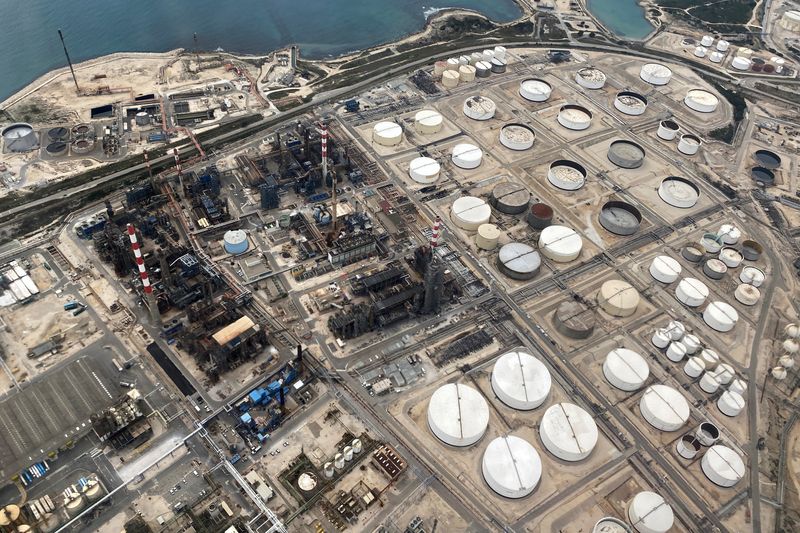By Arathy Somasekhar
HOUSTON (Reuters) -Oil prices settled 3% higher on Monday as production cuts in Libya added to supply concerns stemming from reports of escalating conflict in the Middle East.
Brent crude futures closed $2.41, or 3.05%, at $81.43 a barrel, while U.S. crude futures settled $2.59, or 3.5%, higher at $77.42 a barrel.
Both benchmarks had gained more than 2% on Friday.
"The near-term buying seems justified," said Dennis Kissler, senior vice president of trading at BOK Financial, citing Middle East tensions, Libyan production outages and weak oil inventories at Cushing, Oklahoma, the key U.S. storage hub.
Libya's eastern-based government announced the closure of all oil fields on Monday, halting production and exports.
National Oil Corp, which controls the country's oil resources, provided no confirmation.
However, NOC subsidiary Waha Oil Company said it planned to gradually reduce output and warned of a complete halt to Libya's production, citing unspecified "protests and pressures".
Libya's Sirte Oil Company, another NOC subsidiary, said it will start a partial reduction in production.
Libya's oil production was about 1.18 million barrels per day in July, according to the Organization of the Petroleum Exporting Countries, citing secondary sources.
"The biggest risk for the oil market is probably a further drop in Libyan oil production due to political tensions in the country, with a risk that production could fall from current levels of 1 million barrels per day to zero," said analyst Giovanni Staunovo of Swiss bank UBS.
A long-expected missile attack by the Iranian-backed Hezbollah movement appeared to have been largely thwarted by pre-emptive Israeli strikes in southern Lebanon.
However, the U.S. continues to assess that the threat of attack against Israel by Iran and its proxy groups still exists, the Pentagon said on Monday.
There was no agreement on Sunday in Gaza ceasefire talks that took place in Cairo, with neither Hamas nor Israel agreeing to several compromises presented by mediators, two Egyptian security sources said
An oil tanker has been on fire in the Red Sea (NYSE:SE) since Aug. 23 after an attack by Yemen's Houthis, EU Red Sea naval mission Aspides said in a post on X.
Meanwhile, crude oil inventories at Cushing, the pricing point for U.S. crude oil futures, have fallen to six-month lows.
U.S. crude inventories were expected to have fallen by about 3 million barrels last week, according to a Reuters poll.
Investors remain cautious over the actions of OPEC and its allies, or OPEC+, which has plans to raise output later this year, said Priyanka Sachdeva, senior market analyst at Phillip Nova.
"Most oil forecasters expect 2025 oil demand growth to hover around 1 million b/d. Were Libya to go down in another bout of civil war, the balances of 2025 could look very similar to this year's despite more Saudi and Russian production," Viktor Katona, lead crude analyst at Kpler, added.

On the demand side, increasing signs of lackluster growth and emerging risks to the job market overshadowed a gathering of global policymakers at the U.S. Federal Reserve's annual Jackson Hole conference, highlighting the changing trajectory of monetary policy as U.S. and European central banks eye cutting interest rates.
However, San Francisco Fed President Mary Daly on Monday said it was hard to imagine anything could derail a September rate cut from the current range of 5.25%-5.50%.